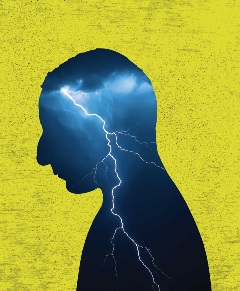Emotional Overload
How grief and trauma course throughout your body.
By Christine Yu

John Chatham, DPhil, FAPS, describes the last year of his wife’s life as stumbling from one crisis to another. As a patient with brain cancer, she was in and out of the emergency department multiple times. “It was slow-moving trauma and slow-moving grief,” says Chatham, professor of pathology at the University of Alabama at Birmingham.
After his wife’s death in 2016, Chatham experienced severe fatigue and brain fog. He lost his appetite and felt less coordinated. He assumed his body just needed to recover from the accumulated stress from caring for his wife and from her death. But two years later, he was diagnosed with a type of arthritis associated with an autoimmune disorder.
Chatham was familiar with the “broken heart syndrome,” also known as stress-induced cardiomyopathy or takotsubo cardiomyopathy. Emotionally stressful events can trigger a surge of stress hormones, leading to severe short-term heart muscle failure. But he wondered if repeated stress events, like he experienced while caring for his wife, affected his long-term health. “Was [the arthritis] caused by that extended period of trauma? By grief? I don’t know, but I could certainly imagine that they are connected,” he says.
The emotional wounds left behind by grief and a broken heart can linger for months or even years. The death of a loved one is one of life’s most traumatic events. Not only can it have a deep and intense impact on our emotional state, it can profoundly affect our physiology, too.
For instance, in the first 24 hours after the death of a significant other, the surviving partner is 21 times more likely to have a heart attack, according to a 2012 study in Circulation. Within the first six months of experiencing a loss, there’s a 41% increased risk of mortality, another study showed. Even after one year, those who have lost a loved one still have a 25% higher risk of dying. And, it’s not only heart attacks and strokes. “It’s all-cause mortality,” says Mary-Frances O’Connor, PhD, associate professor of psychology at the University of Arizona and the author of “The Grieving Brain.”
And it’s not just grief. Emotionally traumatic events can also precipitate meaningful effects on physiology, leading to changes in the immune system and vascular function and increasing the risk of cardiovascular or metabolic conditions.
A shock to the system
When we experience psychological stress—whether it’s grief or emotional trauma—the body responds like it would to a massive physical threat. The hypothalamic-pituitary-adrenal (HPA) axis and the sympathetic-adreno-medullar (SAM) axis are activated, leading to the release of stress hormones such as cortisol and epinephrine, and the immune system is triggered. “This will increase heart rate, blood pressure, inflammatory markers and clotting factors,” says Nathaniel Jenkins, PhD, assistant professor in the Department of Health and Human Physiology at the University of Iowa.
Jenkins studies individuals who have experienced adverse childhood experiences (ACEs). Occurring in the first 18 years of life, ACEs include situations such as physical, emotional and sexual abuse; neglect; witnessing violence; foster care; and what Jenkins describes as “household dysfunction,” such as parental separation or divorce, a family member who has been incarcerated, or a household member who abuses substances.
Sixty percent of people—particularly underrepresented individuals and people from lower socioeconomic status—report one ACE or more. And since these events occur during childhood, Jenkins believes they may be a particularly noxious form of psychosocial stress. “The data is pretty clear across many different cohorts that they’re associated with lifetime risk in a big and meaningful way,” he says.
The HPA and SAM axes are designed to return the body to homeostasis after experiencing a stressor. But in Jenkins’ data, there’s preliminary evidence to suggest that the HPA axis is chronically disrupted. “We see flatter diurnal cortisol in those who have been exposed to high levels of ACEs compared to those without ACEs,” he says.
His data also suggest that those with greater ACE exposure will report an amplified response to subsequent stressful events. “Stress begets stress,” he says. If these systems are continuously activated, it could lead to a maladaptive response and more inflammation. “Higher inflammation will promote higher oxidative stress and vice versa,” he says.
Similar to people who’ve been exposed to ACEs, there’s an increase in cortisol in people who are bereaved, changes that O’Connor says appear to persist. Researchers also see greater markers of inflammation in those who have lost a loved one and particularly in those who experience severe symptoms of grief.
O’Connor has seen blood pressure changes occur in people with the most intense and frequent symptoms of grief. “Not everyone has a really strong grief reaction when a loved one dies for a variety of reasons, and that’s normal. But [severity of grief symptoms] may be a risk factor that we should be looking at in terms of health outcomes,” O’Connor says.
O’Connor was interested in investigating inflammation because the higher risk of dying among those who have lost a loved one is across all causes, not just heart attacks. “Inflammation is something that affects all of our tissues and organs systems. Potentially, it’s a way that stress gets translated into something that could lead to mortality across these different conditions,” she says.
A matter of the heart (and blood vessels)
In some, stress can also lead to depression, a mood disorder in which there’s a relative inability to regulate emotions. “Depression is a risk factor for cardiovascular disease,” says Jody Greaney, PhD, assistant professor at the University of Texas at Arlington. Vascular dysfunction is one of the main pathways, she says.
When Greaney investigated vascular health in humans with depression, she found a blunted endothelium-dependent dilation in adults with mild-to-moderate depression—and in the absence of other risk factors.
“This seems to be mediated in large part by reductions in nitric oxide bioavailability” due to an increase in oxidative stress, Greaney says. The loss of nitric oxide in the blood vessels damages them and how they function. “It has long-term implications that can lead to the development of atherosclerosis and plaque development,” she says.
What’s more, the balance between constriction and dilation appears to be off-balance in adults with depression. “They seem to have this hyper-constrictor state,” Greaney says. “They’re less able to dilate, which is going to increase blood pressure, and that may drive targeted organ damage.” While depression is different and distinct from grief or emotional trauma, Greaney says it’s reasonable to suspect that similar mechanisms may be at play in people who are bereaved or who are survivors of emotionally traumatic events.
Jenkins has found endothelial dysfunction in those who’ve been exposed to ACEs, but it wasn’t always clear why. Recently, he and his team identified disrupted sleep as one possible reason. Sleep disruption is a hallmark symptom of post-traumatic stress disorder (PTSD), and they’ve found a strong association between ACE exposure and sleep disruption.
“We know that stress and sleep have a reciprocal relationship, which we’ve all experienced. When you’re highly stressed or anxious, it’s hard to fall asleep or you might have disrupted sleep,” he says. What’s interesting is that sleep disruption appears to explain some of the association between ACE exposure and vascular dysfunction he’s seen in young adults.
It’s all in the brain
Grief and emotional trauma are two different experiences, yet the body responds in a similar fashion physiologically—for example, elevated heart rate, blood pressure and cortisol. It’s the brain that differentiates between the two. “We don’t see PTSD responses that have to do with the reward network the way we do with grief. We know that amygdala responsivity is important in a trauma response, but we rarely see that in grief,” O’Connor says.
When we love someone, it’s encoded in our brains. The nucleus accumbens, a tiny region deep in the middle of the brain that’s part of the reward system, is vitally important to creating the bond between loved ones. In voles, who bond for life, scientists have seen epigenetic changes in this region. “Once these pair-bonded mates are separated, we see changes in the oxytocin binding in that region. It sets you up to realize that part of you is missing,” O’Connor says.
She believes there’s a similar mechanism at play in humans. In her fMRI studies, there’s a correlation between self-reported yearning for the deceased and nucleus accumbens activation. Because of our neurobiological bond to a loved one, we’re driven to seek them out. At the same time, rationally, we understand the person we love isn’t coming back.
“Part of grieving is reconciling these two ways of understanding the world so you can begin to predict their absence, but it takes time,” O’Connor says.
Learning to cope
Experts are interested in identifying ways to mitigate the physiological changes associated with the death of a loved one or an emotionally traumatic event, especially if they can lead to negative health outcomes.
Caretakers’ health is often overlooked, especially those who are caring for someone with a serious illness such as cancer. They likely haven’t kept up with their own routine medical check-ups and screenings, when doctors would likely notice an increase in blood pressure or potential signs of cancer.
“We had great physicians for my wife and great hospice staff, but when things were getting bad, nobody asked, ‘Are you taking care of yourself? Maybe you need to schedule a checkup.’ Nobody did that, but I could see where that could be a valuable step,” Chatham says.
O’Connor says the medical community has known about the broken heart phenomenon for years. “We know when someone has died. If the medical system really looked at the caregiver or next of kin and recognized that this event has put their cardiac health at risk, we could actually intervene,” she says.
For instance, what if within 24 hours of the death of a loved one, the survivor was given aspirin? She conducted a small feasibility study to investigate. “Imagine a world where, if this was proven to be effective, EMTs, emergency departments, ICUs and palliative care were able to make this recommendation,” she says.
There may be better ways to cope with the psychosocial stress that accompanies traumatic experiences, too. Jenkins is the principal investigator for a pilot project to see whether cognitive behavioral therapy for insomnia (CBT-I) can improve sleep quality in individuals with ACE exposure. The hope is by improving sleep quality, you decrease the risk for cardiovascular disease because sleep disruption is associated with increased risk.
While the project is still in its early phases, the results seem promising. As sleep quality improves, vascular function appears to improve along with it. “If we see improved physiologic function with improved sleep, then we may have a core component of an effective intervention,” Jenkins says. He can imagine potentially layering traditional psychotherapy to address the trauma along with CBT-I.
Grief and emotional trauma aren’t in your mind. It’s a part of your body, which means we can develop the ability to cope with the physiological changes.
“As a community, we can provide support to care for your physical health. We can provide that sort of compassionate response,” O’Connor says.
This article was originally published in the July 2023 issue of The Physiologist Magazine.
“Was [my arthritis] caused by that extended period of trauma? By grief? I don’t know, but I could certainly imagine that they are connected.”
John Chatham, DPhil, FAPS
The Physiologist Magazine
Read the Latest Issue
Don’t miss out on the latest topics in science and research.
Contact Us
For questions, comments or to share your story ideas, email us or call 301.634.7314.


